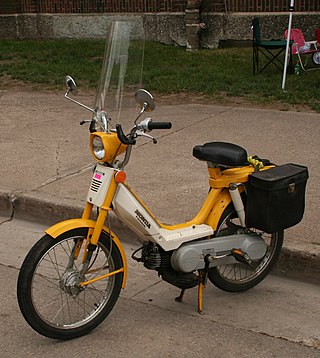
A moped is a type of small motorcycle, generally having a less stringent licensing requirement than full motorcycles or automobiles. Historically, the term exclusively meant a similar vehicle with both bicycle pedals and a motorcycle engine. Mopeds typically travel only slightly faster than bicycles on public roads.
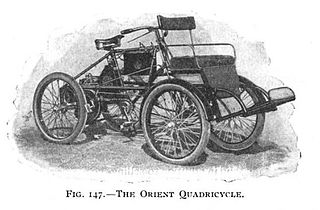
The Quadricycle was an early form of automobile. Earliest models were propelled by a small steam engine, then designers switched to early internal combustion engines as they became available. The word is derived from the fact that it had four wheels and used a lot of technology from the bicycles of the era.

A monowheel or uniwheel is a type of one-wheeled, single-track vehicle. Unlike the unicycle, a monowheel consists of a large, hollow wheel that loops above and around the driver. Monowheels are typically powered by an engine as with a motorcycle, with a chassis securing the steering, driver's seat, and propulsion mechanism to the interior of the wheel.
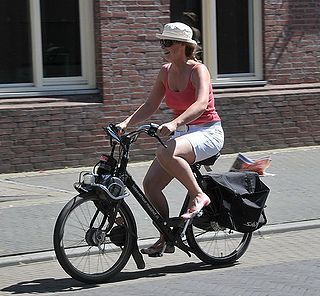
A motorized bicycle is a bicycle with an attached motor or engine and transmission used either to power the vehicle unassisted, or to assist with pedalling. Since it sometimes retains both pedals and a discrete connected drive for rider-powered propulsion, the motorized bicycle is in technical terms a true bicycle, albeit a power-assisted one. Typically they are incapable of speeds above 52 km/h (32 mph), however in recent years larger motors have been built, allowing bikes to reach speeds of upwards of 72 km/h.
Many countries have enacted electric vehicle laws to regulate the use of electric bicycles, also termed e-bikes. Some jurisdictions have regulations governing safety requirements and standards of manufacture. The members of the European Union and other regions have wider-ranging legislation covering use and safety.
This timeline of motorized bicycle history is a summary of the major events in the development and use of motorized bicycles and tricycles, which are defined as pedal cycles with motor assistance but which can be powered by pedals alone.

A motorized scooter is a stand-up scooter powered by either a small internal combustion engine or electric hub motor in its front and/or rear wheel. Classified as a form of micromobility, they are generally designed with a large center deck on which the rider stands. The first motorized scooter was manufactured by Autoped in 1915.

Ariel Motorcycles was a British maker of bicycles and then motorcycles in Bournbrook, Birmingham. It was an innovator in British motorcycling, part of the Ariel marque. The company was sold to BSA in 1951 but the brand survived until 1967. Influential Ariel designers included Val Page and Edward Turner. The last motorcycle-type vehicle to carry the Ariel name was a short-lived three-wheel tilting moped in 1970.

American Bicycle Company (1899-1903) was an American bicycle company (Trust) led by Albert Augustus Pope. The company was formed to consolidate the manufacturers of bicycles and bicycle parts. In the 1890s the advancements in bicycle design led to unprecedented demand for the new Safety bicycles. The "American Bicycle Company" trust only lasted for three years.
Rex, Rex Motorcycles, Rex-Acme, was a car and motorcycle company which began in Birmingham, England in 1900. Rex soon merged with a Coventry maker of bicycles and cars named Allard and then later in 1922 the company merged with Coventry's 'Acme' motorcycle company forming 'Rex Acme'. The company existed until 1933, and, in its heyday, was considered one of the greatest names in the British motorcycle industry.
The history of the motorcycle begins in the second half of the 19th century. Motorcycles are descended from the "safety bicycle," a bicycle with front and rear wheels of the same size and a pedal crank mechanism to drive the rear wheel. Despite some early landmarks in its development, the motorcycle lacks a rigid pedigree that can be traced back to a single idea or machine. Instead, the idea seems to have occurred to numerous engineers and inventors around Europe at around the same time.
A motorcycle is a single-track two-wheeled motor vehicle. It is also known as a motorbike.

The Gladiator Cycle Company, Clément-Gladiator, was a French manufacturer of bicycles, motorcycles and cars based in Le Pré-Saint-Gervais, Seine.

A scooter is a motorcycle with an underbone or step-through frame, a seat, a transmission that shifts without the operator having to operate a clutch lever, a platform for their feet, and with a method of operation that emphasizes comfort and fuel economy. Elements of scooter design were present in some of the earliest motorcycles, and motor scooters have been made since at least 1914. More recently, scooters have evolved to include scooters exceeding 250cc classified as Maxi-scooters.

Johnson Motor Wheel was a kit to convert a bicycle into a motorized bicycle. It was manufactured by an American firm, Johnson Brothers Motor Company in Terre Haute, Indiana.
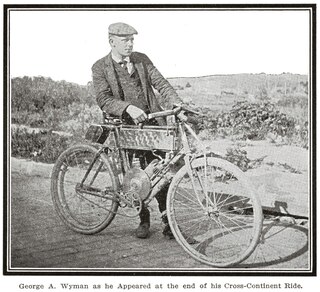
George Adams Wyman was the first person to make a transcontinental crossing of the United States by motor vehicle. In 1903, Wyman rode his 1902 California Motor Company motor bicycle from San Francisco to New York City in 51 days, finishing 20 days before Dr. Horatio Nelson Jackson, the first person to cross the continent by automobile.
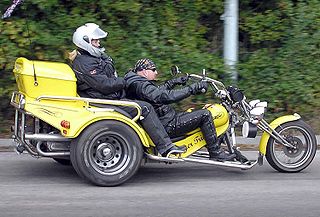
A motorized tricycle, motor trike, or motortrycle is a three-wheeled vehicle based on the same technology as a motorcycle, and powered by an electric motor, motorcycle, scooter or car engine.

Rixe & Co. was a German bicycle, moped, and small motorcycle manufacturer with a factory in Brake, Bielefeld, Germany from 1921 to 1984.













